Experts recommend having infants sleep in your bedroom but not in your bed

Image content: This image is available to view online.
View image online (https://assets.clevelandclinic.org/transform/9c3b2a75-10a6-4bdc-90f2-66e4b82d14ab/parent-Baby-Room-Share1-1136413257-770x533-1_jpg)
Parent and baby share a room for sleeping.
It’s understandable that parents want to be close to their baby while sleeping at night. But being too close by sharing a bed increases the risk of an infant’s injury or death — a warning emphasized in safe sleep recommendations.
Advertisement
Cleveland Clinic is a non-profit academic medical center. Advertising on our site helps support our mission. We do not endorse non-Cleveland Clinic products or services. Policy
The solution? Set up your infant as a roommate instead of a bedmate. It’s a distinction that could be lifesaving, explains pediatrician Heidi Szugye, DO, IBCLC. Here’s why.
There’s nothing subtle about this advice offered by the American Academy of Pediatrics (AAP): “Never sleep with your baby.”
The AAP recommends that parents not share a bed with their baby. The reason? The risk of a sleep-related infant death while bed sharing is five to 10 times higher during that early stage of life, says Dr. Szugye.
Put simply, an adult bed is not set up with infant safety in mind. Parents can accidentally roll onto their infants when asleep. In addition, pillows, bedding and high and soft mattresses increase the risk of sudden infant death syndrome (SIDS) or injury or death by:
“Bed sharing is connected to SIDS. There’s no question about it,” says Dr. Szugye. “We don’t recommend it for babies of any age.”
(On a side note, the term “co-sleeping” is often used for bed sharing. However, the phrase is also used to describe the recommended practice of room sharing, which we’ll cover in a moment. Given that, the AAP and many pediatricians avoid the term co-sleeping to avoid confusion.)
Advertisement
Nodding off with a baby while on a couch or soft armchair is even more dangerous than sharing a bed with them. The AAP reports that the risk of a sleep-related infant death may be up to 67 times higher in that situation.
Sharing a sleep surface with an infant is cause for concern on its own, but the arrangement becomes even more dangerous if the adult is overly fatigued or has been:
“You especially want to avoid bed sharing in any of those situations,” stresses Dr. Szugye.
Absolutely. Sharing a bed with an infant is riskier if the child is younger than 4 months old, says Dr. Szugye. In addition, the risk level rises if your baby was born premature or with a low birth weight.
Keeping your baby close while they sleep doesn’t mean they have to be in the same bed, says Dr. Szugye. Instead, consider a “room sharing” approach, where you place your child’s crib or bassinet next to your bed.
This setup allows your baby to be next to you but in their own sleep environment. The AAP reports that room sharing can reduce the risk of SIDS by as much as 50%. (Learn seven ways to reduce your baby’s risk of SIDS.)
“It’s a nice alternative to bed sharing,” says Dr. Szugye. “It maintains the closeness that can make life easier on parents while letting your baby sleep in a safer space that fits their needs.”
To reduce the risk of sleep-related infant death, the AAP recommends the following:
Despite the warnings, studies show that bed sharing with babies remains a common practice. In fact, 61% of infant caregivers reported some form of bed sharing with babies, according to the Centers for Disease Control and Prevention (CDC).
Reasons given for bed sharing include:
Deep feelings for bed sharing have made recommendations warning against the practice somewhat controversial. There also are studies showing that bed sharing can promote breastfeeding and help calm infants.
But that doesn’t erase the clear evidence that bed sharing increases the risk of a sleep-related death for babies.
Advertisement
“The recommendation against bed sharing is based upon data,” says Dr. Szugye. “It’s something for parents to consider as they’re making decisions about how to best care for their child.”
To hear more from Dr. Szugye on this topic, listen to the Health Essentials Podcast episode “Babies and Bedtime.” New episodes of the Health Essentials Podcast are available every Wednesday.
Advertisement

Delivered every Tuesday!
Sign up for our Health Essentials emails for expert guidance on nutrition, fitness, sleep, skin care and more
Learn more about our editorial process.
Advertisement
Have a snow — ball and help them strengthen their developmental skills
An ER doc shares tips for being careful while having fun
Tips for clearing your snow more safely
Candles release hydrocarbons into the air, but don’t pose a significant health risk
Tips for a fun, safe holiday for adults and children
Type 2 diabetes isn’t inevitable with these dietary changes
Applying a hot or cold compress can help with pain
Pump up your iron intake with foods like tuna, tofu and turkey